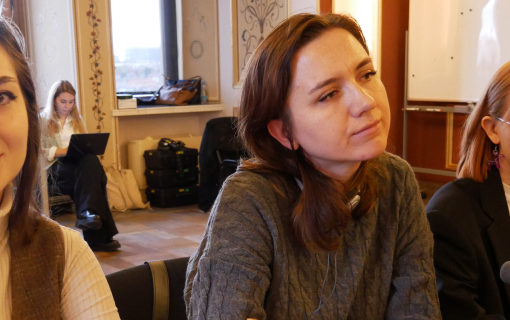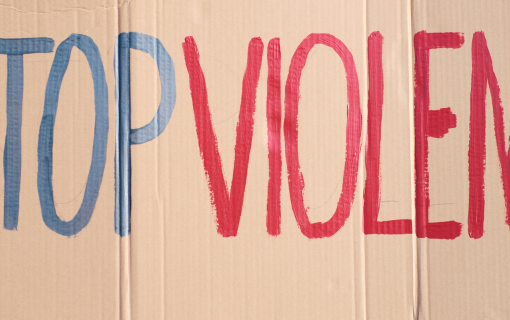
Women in the Military: Lessons on Leading and Women’s Expanded Role in Combat
On January 21, the International Foundation for Electoral Systems (IFES) and the Office of Congresswoman Sheila Jackson Lee (TX-18) hosted “Women in the Military: Lessons on Leading and Women’s Expanded Role in Combat,” the fourth installment of the “Women, Peace and Security” Capitol Hill breakfast briefing series.
Bill Sweeney, IFES President and CEO, opened the event by highlighting the catalytic role militaries can play in democratic transitions and political processes, the field in which IFES operates. Furthermore, he considers “the role of women in the military [absolutely central],” with recent policy changes setting the stage for greater numbers of and roles for women in the American military. Jessica Huber, IFES Senior Gender Specialist, then introduced panelists Carolyn J. Washington, a retired U.S. Army Colonel; Susan Lukas, a retired U.S. Air Force Reserve Lieutenant Colonel and Director of Legislative and Military Policy for the Reserve Officers Association; and Ellen Haring, a retired U.S. Army Colonel and Senior Fellow at Women in International Security.
Washington launched the conversation with an overview of the United Nations Security Council Resolution 1325 (UNSCR 1325) on Women, Peace and Security. She reminded audience members that “conflict is fought on the bodies of women,” who are often subsequently left out of the peacemaking process. Washington also noted that the Obama administration has focused on diplomacy, development and defense in its implementation of UNSCR 1325, through its National Action Plan on Women, Peace and Security. Unfortunately, she has seen little focus on gender mainstreaming – the fourth pillar of UNSCR 1325 – within the defense field and pointed to the need for combat integration policies and a major cultural change. She closed her comments by calling for stronger leadership on these issues and for Congress to hold organizations like the U.S. military, U.S. Agency for International Development and Department of State accountable for any lack of progress.
Huber thanked Washington for her call for systematic approaches to addressing gender equality in both policy and culture. She then introduced Lukas, who discussed UNSCR 1325 through the lens of her work with the United Nations in Bosnia in the lead-up to the signing of the Dayton Peace Accords. Lukas recounted how they encountered war-torn conditions, and how multiple attempts were made on her life by groups opposing peace. Throughout her deployment, U.S. Ambassador Jacques Paul Klein had great trust in her abilities and those of local women, which allowed them to garner respect and take on greater leadership roles. Lukas found that, in doing so, he proved himself a valuable supporter of military women in leadership – and that more of such allies were needed in Washington.
Haring then discussed changes made by the U.S. military in more recent years. Former Secretary of Defense Leon Panetta rescinded the military’s direct combat exclusion policy in 2013, which Haring highlighted as a change “from automatic exclusion to automatic inclusion” of women. Although January 1, 2016 was the original deadline for integration, it has since been pushed to April 1. Haring’s research has found that, despite some improvements, the vast majority of combat positions remain closed to women. Most integration concerns have centered on physical requirements, even with a notable absence of published training and job standards, particularly for the Marine Corps. The U.S. military is not alone in its exclusion as, “today, only fifteen percent of the world’s militaries allow women to serve.” Like Washington, Haring called on Congress to hold senior leaders accountable for ensuring effective change and messaging.
To begin the question-and-answer portion of the event, Huber asked the panelists about the U.S. military’s chain-of-command and resistance to changes like those introduced by Panetta. The panelists reiterated the need for public engagement with senior leadership and a cultural change; Lukas posited that a generational change would be key in the military’s transformation. The panelists then fielded questions from a number of Congressional staff members, including several retired service members, on topics such as selective service; the role of economic stability in leadership; the definition and shifting of job standards; and the U.S. military’s potential use of more gender-sensitive terminology.
Sweeney closed the event by thanking Congresswoman Jackson Lee, service members and those in public service. In keeping with the spirit of IFES’ mission, he then highlighted the importance of such dialogues for the democratic process.
To view a photo gallery of the event, please click here.
IFES’ next “Women, Peace and Security” briefing on “Women with Disabilities” will be held on Wednesday, March 23, 2016. To RSVP, please contact Liz Sidell at esidell@ifes.org.









